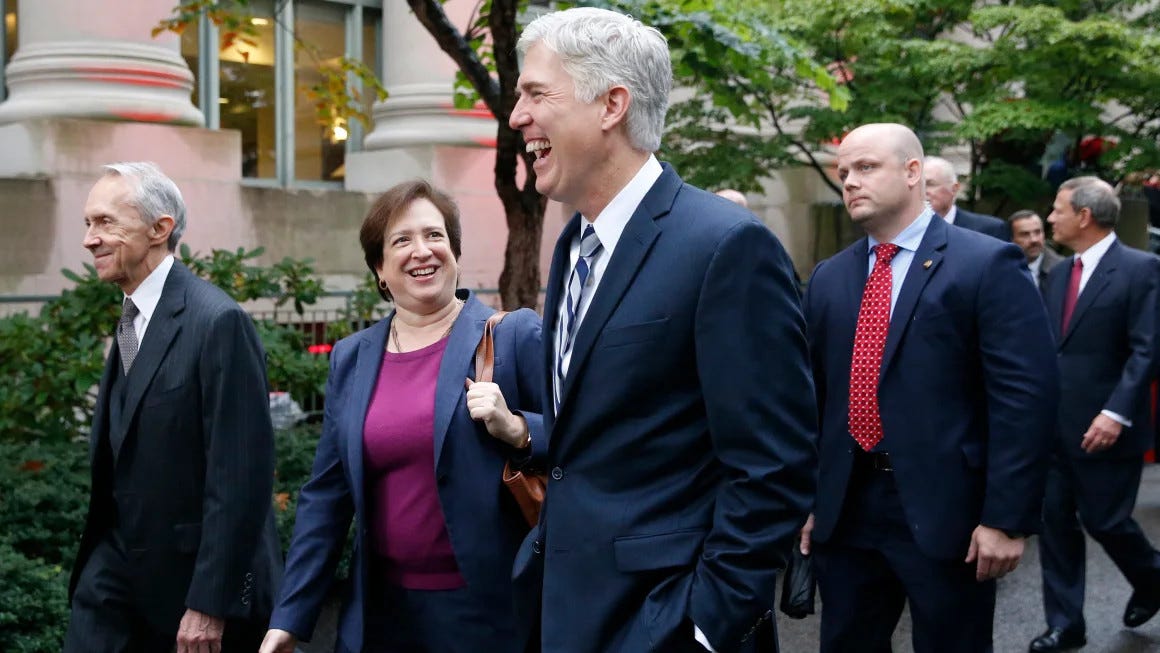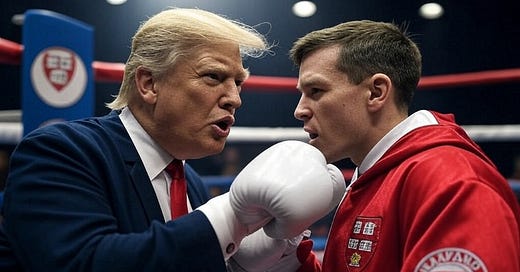Why Harvard v. Trump Is a Losing Fight for Harvard
The Executive Branch Has Eight Ways To Sunday To Pursue Its Objectives.
The media coverage of Harvard v. Trump thus far demonstrates a lack of objective legal and political analysis. That is good for Harvard in the short term, but it fosters a false sense of security and inflated sense of moral standing that encourage the university down a shaky and narrowing path—one that may lead to federal criminal indictments.
Harvard may succeed, at least at first, in enforcing many of the federal contracts and grants awarded by previous administrations. New grants and contracts are likely a different story.
Steady readers of this publication may remember the case of Diamond Ranch Academy (D.R.A.). (MartyG Reports consistently covers the “troubled-teen industry” and its relationship with regulators.) After years of child-abuse and neglect allegations and the deaths of three children in its care, D.R.A. found itself on the wrong side of Utah’s state government.
At first Utah tried to revoke D.R.A.’s license. That implicated D.R.A.’s due-process rights, and D.R.A. fought it successfully. Utah then waited for D.R.A.’s license to expire and declined to renew it—a much harder decision to challenge in court, and one that proved fatal to D.R.A.
Harvard, similarly, needs a steady stream of new federal contracts and grants to replace expiring ones. That is good for Trump, whose term lasts until January 2029. And just like Utah had more discretion to deny D.R.A.’s license renewal than to revoke its license at midlife, the Trump administration has significantly more discretion to deny Harvard new contracts and grants than it does to cancel existing ones.
And when it comes to new funding, some at Harvard may be surprised to learn that Harvard is not a protected class under federal law. The federal government is thus unobliged to favor Harvard, and free to discriminate against it as long as it does not do so because of, e.g., race, sex, age or religion.
To prove unlawful discrimination, Harvard likely would have to show the administration lacked other motives—permissible motives—to award contracts and grants elsewhere. That is, perhaps, too heavy a lift, even for Harvard’s lawyers. The hardest part likely stems from Harvard’s lackluster track record against academic dishonesty.
Last year, for example, researchers at Harvard’s Dana-Farber Cancer Institute were “accused of manipulating data images with simple methods, primarily with copy-and-paste in image editing software, such as Adobe Photoshop.”
The allegations directly implicated Dana-Farber’s President and C.E.O. Laurie Glimcher, Research Integrity Officer Barrett Rollins, Executive Vice President and C.O.O. William Hahn and Senior Vice President for Experimental Medicine Irene Ghobrial, as well as Harvard Medical School Professor Kenneth Anderson.
Six studies were retracted in their entirety and 31 others corrected.

Hahn and Ghobrial remain in their positions today, as do Rollins and Anderson. Glimcher also remains at Harvard, though not as president of Dana-Farber.
No federal law requires the Trump administration to continue to issue grants to universities that fabricate cancer research then decline to take meaningful action against individual perpetrators. Nor would it be an easy argument that such grants were withheld due to unlawful discrimination.
In this regard, and many others, Harvard is throwing rocks from a glass house. And, unlike Harvard, the Trump administration has ample options to escalate, including criminal charges.
A decade ago, for example, Dr. Dong Pyou Han, then a 58-year-old Iowa State vaccine researcher, was sentenced to 57 months in prison and ordered to pay over $7 million in restitution for faking H.I.V./AIDS data.
“It is important that we stand up not just for punishing the fraud committed against the United States government,” said then–United States Attorney Nicholas A. Klinefeldt, “but for the research that should be legitimately taking place on this devastating disease.”
Harvard would be hard pressed to explain why the same should not be said of its own fake data. (U.S. Attorney General Pam Bondi did not respond to a request for comment as to whether the Justice Department has considered or is considering federal criminal charges in the Dana-Farber incident.)
Nor was this an isolated event. Harvard also determined last year that its own Francesca Gino—who published papers on topics including honesty and authenticity—had “committed research misconduct intentionally, knowingly, or recklessly.”
Similarly problematic is Harvard’s recent report on campus life after October 7, 2023. Therein Harvard essentially admitted its acquiescence to racial and religious discrimination and apologized. Harvard’s mea culpa may be heartfelt, but it also seems a tacit guilty plea to a federal felony. (U.S. Attorney General Pam Bondi did not respond to a request for comment as to whether the Justice Department has considered or is considering filing federal criminal charges for deprivation of civil rights.)
Of course, in any court battle, Harvard may hope for help from the very top. It counts among its alumni more Supreme Court justices than any other university. Elena Kagan, in particular, was dean of Harvard Law School.
Harvard’s dominance was on particular display in 2017, when five of the court’s nine members attended Harvard Law’s bicentennial. Harvard Law Today was sure to note that the five justices were “enough to swing a case.”
“A minority of my colleagues send their regrets,” Chief Justice John Roberts similarly told the crowd. (Harvard’s influence on the court has since diminished to four of the nine justices.)

But Harvard may find its alumni on the court unable to help. The Trump administration may argue that photos like the one, above, and Roberts’s statement to the Harvard crowd contradict the Supreme Court’s Code of Conduct, and thus require the relevant justices to remove themselves from the case.
The Code of Conduct states: “A Justice should neither knowingly lend the prestige of the judicial office to advance the private interests of the Justice or others nor knowingly convey or permit others to convey the impression that they are in a special position to influence the Justice.”
It certainly would not be the weakest recusal question to challenge the Supreme Court in recent memory. And it may be a tantalizing vehicle for Trump to force such an issue to the very top, after moving to recuse lower judges in his own cases over the past few years.
Pragmatism, it seems, indicates that Harvard has the weaker position against the Trump administration. Perhaps the university, though it long ago abandoned classical-language graduation requirements, would do well to remember a lesson first written in Greek: hoti pantēs hoi lambanontes machairan en machaira apolountai (“For all those who take the sword shall perish by the sword.”).





The conflict between Harvard and Trump presents a complex interplay of positive and negative impacts.
It highlights the importance of academic freedom and community solidarity.
On the other hand, it raises concerns about financial stability and societal polarization.
The latter can have an outcome that has lasting implications for higher education and government authority on relationships with donors and funding sources, contentious environment on campus and in the public and financial consequences and risks.
Is Harvard willing to go all the way, time will tell. I believe the line drawn out will stop short of losing donors money and reputation. The finish line is right around the bend.